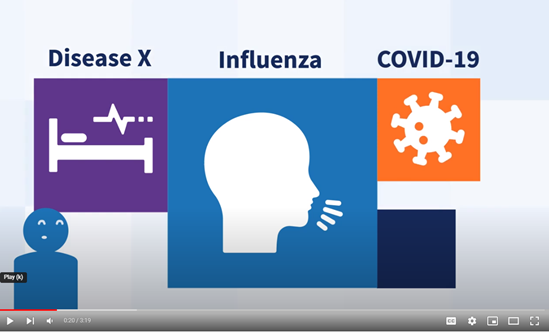Influenza Investigations & Studies (Unity Studies)
c9b820a9-f650-42ae-8434-4bbe551056c9.tmb-1920v.jpg?Culture=en&sfvrsn=54437c9f_1)
Introduction and approach
The Influenza Investigations & Studies Global Initiative, also known as the Unity Studies, provides a pandemic preparedness and readiness framework for conducting targeted investigations and studies that are critical to the risk assessment of novel influenza viruses or other emerging respiratory viruses of pandemic and epidemic potential.
The Unity Studies are critical tools to supplement routine surveillance to address specific questions, particularly in the early stages of a pandemic, but also over time through a continuous, periodic, or alert driven (e.g. emergence of a subtype, variant or lineage of public health significance) assessment process. These investigations and studies are intended to be used to rapidly assess transmissibility, estimate population susceptibility and/or immunity and infection/disease severity, support identification of risk groups or population groups in need to target interventions, and assess effectiveness of interventions (e.g. vaccine effectiveness). In addition, Unity Studies support forecasting of the course of a pandemic and inform the optimal Public Health and Social Measures and allocation of medical countermeasures.
For more information on the initiative and lessons learned during the COVID-19 pandemic, please see:
- A framework for seroepidemiologic investigations in future pandemics: insights from an evaluation of WHO’s Unity Studies initiative. http://doi.org/10.1186/s12961-023-00973-z
- Early epidemiological investigations: World Health Organization UNITY protocols provide a standardized and timely international investigation framework during the COVID-19 pandemic. https://doi.org/10.1111/irv.12915
- Learning from serosurveillance for SARS-CoV-2 to inform pandemic preparedness and response https://doi.org/10.1016/S0140-6736(23)00964-9
Standardized template protocols
A series of standardized template protocols have been developed for influenza-specific investigations, and potentially for investigating other respiratory viruses of pandemic potential, for use at different stages of a pandemic course (see below table).
Access influenza template protocols:
- The First Few X cases and contacts (FFX) investigation template protocol for pandemic influenza A(HxNy) Link
- Household transmission (HHTI) investigation template protocol for pandemic influenza A(HxNy) Link
- Closed settings transmission investigation template protocol for pandemic influenza A(HxNy) Link
- Protocol to investigate outbreak of non-seasonal influenza and other emerging acute respiratory disease Link
- Population-based age-stratified seroprevalence investigation template protocols for respiratory pathogens with pandemic potential Link
- (More under development, ex. FFX “light”, vaccine effectiveness, health workers, rapidly assessing severity)
Figure 1: Disease pyramid of a given respiratory infection, the Unity Studies protocols and associated epidemiological parameters
(Click on image to enlarge and download)

Table 1: Unity Studies protocols aligned with the pandemic periods of the organizing framework for respiratory pathogen pandemic planning, Preparedness and Resilience for Emerging Threats (PRET) (https://www.who.int/publications/m/item/preparedness-and-resilience-for-emerging-threats-module-1-planning-for-respiratory-pathogen-pandemics-version-1)
Governance
Unity Studies Network Sites will be governed by the terms of reference provided below. The ToR provides a description of the duties of the network sites, of the benefits of participating in the network, as well as criteria for site selection. It also details how interested institutions/entities can join this global effort.
Supporting toolkit items
- Statistical analysis plan for First Few X cases and contact investigations, Household Transmission investigations and Closed settings investigations protocol Link
- Design, reporting and critical appraisal tool of household transmission investigation. Link
- Reporting of Seroepidemiologic Studies for influenza (ROSES-I statement by CONSISE). Link
- Ethical considerations toolkit Link
Communication materials
- Brochure (in development)
- Video
Monitoring and evaluation
The Unity Studies has one annual collected key performance indicator, included in the High-Level Implementation Plan (HLIP III) of the Pandemic Influenza Preparedness (PIP) Partnership Contribution (PC) for the 2024-2030 period, as part of Output 2 on Collaborative Surveillance, Deliverable B: “Resilient surveillance systems are improved and maintained in a One Health context”.

Participation means that the network sites are operationally ready per Unity Studies network Terms of Reference (ToR above). For more metadata and targets of this indicator, please consult the PIP PC HLIP III here: https://www.who/int/publications/i/item/9789240070154
Partners collaboration
(In alphabetical order)
- Centers for Disease Control and Prevention, United States of America (US CDC)
- Consortium for the standardization of influenza seroepidemiology (CONSISE)
- Epiconcept
- Global Research Collaboration for Infectious Disease Preparedness (Glopid-R)
- McGill University, Canada
- International Pasteur Institute Network
- Robert Koch Institute
- SeroTracker
- University of Melbourne, Australia
Supporting frameworks and strategy
(in alphabetical order)
- Expanded GISRS strategic action plan (in development)
- Global Influenza Strategy. Link
- Mosaic Respiratory Surveillance Framework. Link
- Pandemic Influenza Preparedness Framework Partnership Contribution. Link
- Preparedness and Resilience for Emerging Threats (PRET) initiative, Module 1 Respiratory Pathogens. Link
- WHO guidance for surveillance during an influenza pandemic. Link
- WHO Outbreak Toolkit. Link
Related health topics
Contact
For more information or questions, email: unity@who.int

/epidemic-and-pandemic-preparedness-and-prevention-(epp)/global-influenza-programme-(gip)/unity-studies-meeting.png?sfvrsn=da6581c2_3)




